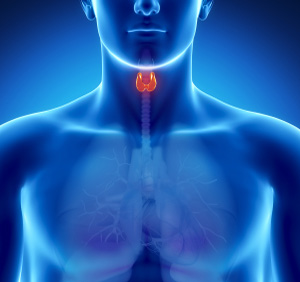Thyroid Disorders

The most common thyroid disorders include hypothyroidism and hyperthyroidism. Having hypothyroidism and hyperthyroidism can be both unpleasant and uncomfortable, but these thyroid conditions can be managed if properly diagnosed and treated.
Hypothyroidism
What is hypothyroidism?
Hypothyroidism is a condition in which your thyroid gland does not make enough of the most important thyroid hormones called triiodothyronine (T-3) and thyroxine (T-4).
What are the symptoms of hypothyroidism?
Some more common symptoms of hypothyroidism include the following:
- Weight gain
- Fatigue
- Muscle weakness or stiffness
- Dry or cold skin
- Heavy or irregular menstrual periods
- Constipation
- Elevated blood cholesterol level
- Slowed heart rate
- Depression
- Low sex drive
- Joint pain
- Cold extremities
- Mental Fog
What causes hypothyroidism?
Decreased thyroid levels can be caused by a variety of factors. These include the following:
- Nutritional defeciencies
- Inadequate conversion of T4 and T3 thyroid hormones.
- Prolonged illness.
- Chronic stress
- Aging
- Toxic metal exposure (mercury, lead, cadmium)
- Autoimmune factors (thyroid antibodies which can block the thyroid hormone from attaching to the thyroid receptors).
- Dietary factors.
- Certain medications
Your doctor will check for hormone deficiency before beginning treatment.
How is hypothyroidism treated?
There are several different hypothyroidism treatments that are available. Replacing both T4 and T3 thyroid hormones have been shown to be very effective for many.
Treatment may also include certain botanicals, dietary changes, and various nutrients and minerals that can increase the conversion of T4 to T3 thyroid hormones. We also include treatments aimed at supporting the metabolism and synthesis of thyroid hormones.

Hyperthyroidism
What is hyperthyroidism?
Hyperthyroidism is a condition in which your thyroid makes too much of the thyroid hormone, called thyroxine. Your thyroid controls your metabolism, and hyperthyroidism can speed up your metabolism to above-normal levels.
What are the symptoms of hyperthyroidism?
Common symptoms of hyperthyroidism include:
- Rapid weight loss
- Excessive sweating
- Insomnia
- High blood pressure
- A rapid or irregular heartbeat
- Eye sensitivity
- Anxiety
What causes hyperthyroidism?
Hyperthyroidism is a form of hormonal imbalance; in this case the thyroid gland is over-productive. This can cause a host of health problems, so as a first test your doctor will likely check your hormone levels.
How is hyperthyroidism treated?
In addition to things such as medication and lifestyle changes, hyperthyroid treatment typically consists of hormone replacement therapy. In particular bio-identical hormone replacement therapy (BHRT) which equalizes your thyroid gland by using hormones that are identical to those produced in your body naturally.
Have a Healthy Thyroid
If you think you're experience the symptoms of a thyroid disorder, it's best to start treatment right away. Call (914) 245-3056 or request more information online to set up a thyroid consultation.






